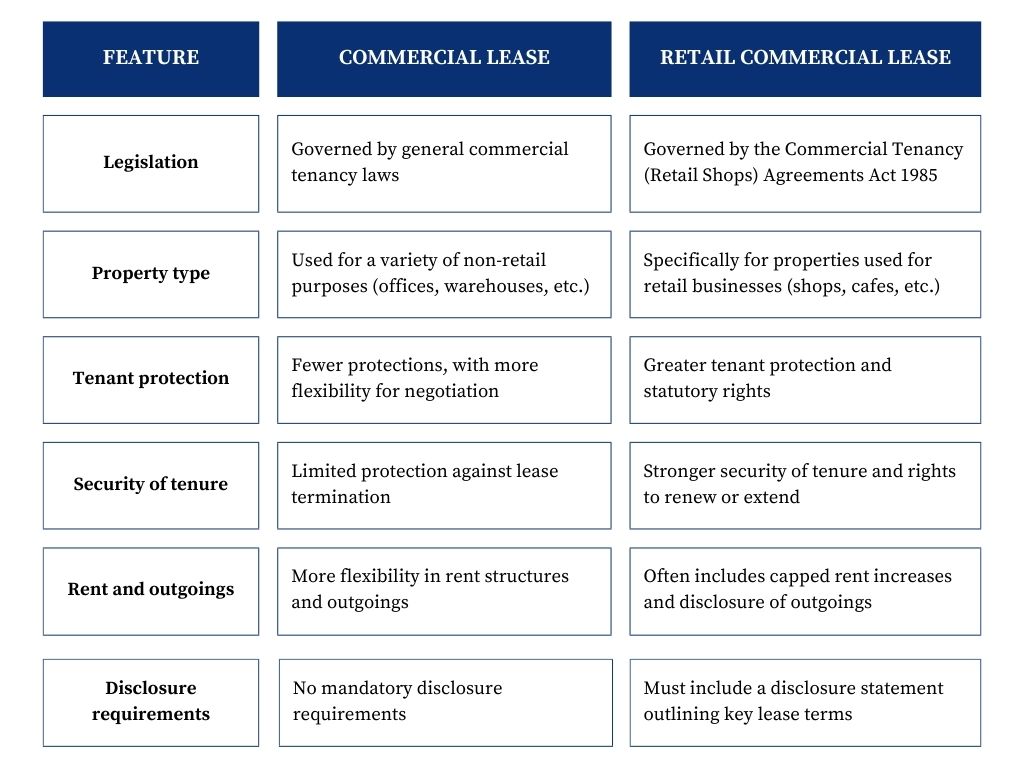Understanding the difference between Commercial Leases and Retail Leases

When it comes to leasing commercial space in Western Australia, two primary types of leases that business owners and property managers commonly encounter are commercial leases and retail commercial leases. While they may seem similar on the surface, these two types of leases differ significantly in terms of their legal obligations, protections, and application. Understanding these differences is crucial for business owners to ensure they are entering into commercial tenancy agreements that align with their business goals, protect their interests, and comply with the relevant legislation.
In this article, we will break down some of the differences between a commercial lease and a retail commercial lease in Western Australia and explain how we can assist you with the preparation and negotiation of both types of lease agreements in order to best protect your interests, whether as a landlord (also known as the lessor) or as a tenant (also known as the lessee).
What is a commercial lease?
A commercial lease generally refers to any lease agreement for non-residential property, which may include office spaces, warehouses, industrial facilities, or mixed-use properties. These leases are typically used by businesses of various industries, from small offices, a retail shopping centre, to large-scale manufacturing operations.
Commercial leases in Western Australia are primarily governed by the Commercial Tenancy (Retail Shops) Agreements Act 1985 and, where applicable, the Property Law Act 1969.
Some key features of a commercial lease:
- Flexibility: Commercial leases are often more flexible in terms of the property type and usage. They can be tailored to meet the needs of the tenant and landlord, with specific terms depending on the property and its intended use.
- Lease terms: Commercial leases can range from short-term agreements to long-term contracts. The terms are negotiated between the parties and can vary widely based on the specifics of the lease.
- Rent and outgoings: The rent structure in commercial leases can vary, and tenants may be responsible for additional outgoings such as maintenance, insurance, and utilities.
- Less regulatory oversight: Compared to retail leases, commercial leases generally have fewer statutory protections for tenants, offering both landlords and tenants greater flexibility to negotiate terms.
What is a retail commercial lease?
A retail commercial lease specifically refers to leases for properties that are used for retail purposes—such as retail shops, cafes, restaurants, or other customer-facing businesses. In Western Australia, retail leases are subject to more specific regulations than general commercial leases, particularly pursuant to the Commercial Tenancy (Retail Shops) Agreements Act 1985, which provides significant protections for retail tenants.
Some key features of a retail commercial lease:
- Legislative protections: Retail leases are governed by stricter rules to protect the tenant’s interests. These protections include limitations on rent increases, requirements for disclosure of the terms of the lease, and the provision of fair dispute resolution mechanisms.
- Security of tenure: Retail tenants often enjoy more security of tenure under the law, which can include rights to renewal or extensions of the lease, even if the landlord is unwilling to negotiate a new lease.
- Standard lease terms: The lease agreement for a retail space will typically outline fixed terms, including rent, outgoings, and lease duration. The lease must also include a disclosure statement with key information about the property and the lease terms before signing.
- Additional rights and obligations: Retail business tenants have the right to request certain conditions (such as rent reductions or repairs) be negotiated or enforced under the legislation. There are also more rigid rules regarding the landlord’s right to terminate the lease or alter lease terms.
Key differences between commercial and retail leases

Navigating the complexities of commercial and retail shop leases can be challenging. Whether you’re a landlord seeking to draft or negotiate a lease, or a tenant reviewing your lease agreement, our experienced team at Lewis Kitson Lawyers has the expertise to help you understand your rights, obligations, and opportunities.
Our services include:
- Lease negotiation: We assist both landlords and tenants in negotiating the best terms for their lease agreements, ensuring that your interests are protected.
- Lease review and drafting: Our team can review existing leases or draft new agreements that are clear, enforceable, and tailored to your business needs.
- Dispute resolution: If you’re facing a dispute over lease terms, rent increases, or other leasing matters, we offer expert advice and representation to resolve the issue efficiently.
- Compliance and advice: We provide advice on the legal requirements and obligations under both general commercial leasing laws and the specific regulations governing retail leases in Western Australia.
- Security of tenure and lease renewals: We help retail tenants navigate their rights to renew or extend their lease, ensuring you are not at risk of unexpected termination or unfavourable terms.
Whether you are entering into a commercial lease or negotiating a retail lease, understanding the legal framework surrounding each type of agreement is vital. At Lewis Kitson Lawyers, we are committed to helping you make informed decisions and protecting your business’s best interests.
If you are looking for expert legal advice on commercial or retail leases in Western Australia, contact Lewis Kitson Lawyers today. Our experienced team of legal professionals is here to guide you through the process, ensuring that you achieve the best possible outcome for your business.
Further Reading:
Selling a Shared Property? How to Apply Section 126 to Resolve Property Co-Ownership Issues
All information on this site is general information only, and does not constitute specific legal advice. Please consult one of our experienced legal team for specific advice relevant to your situation.
